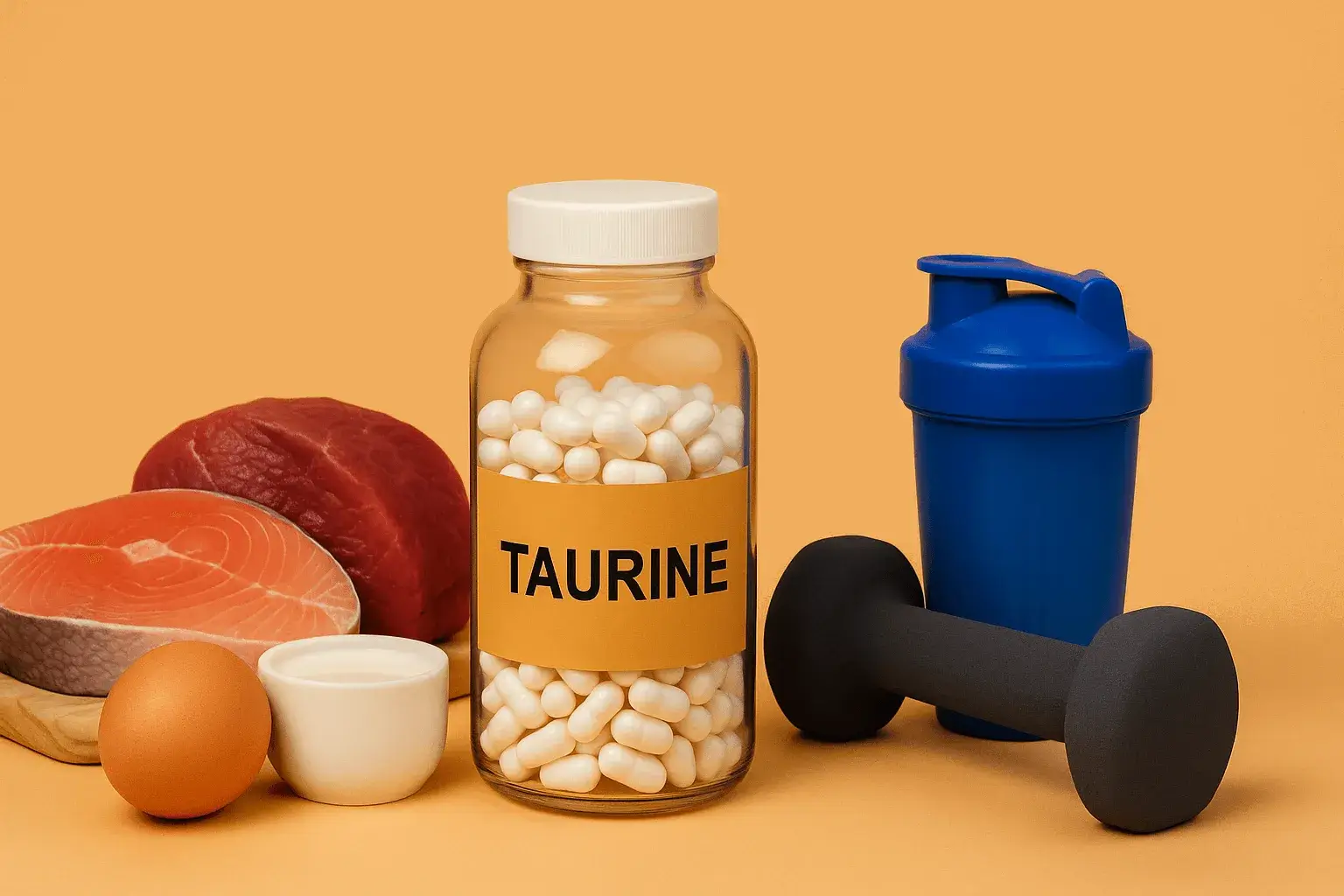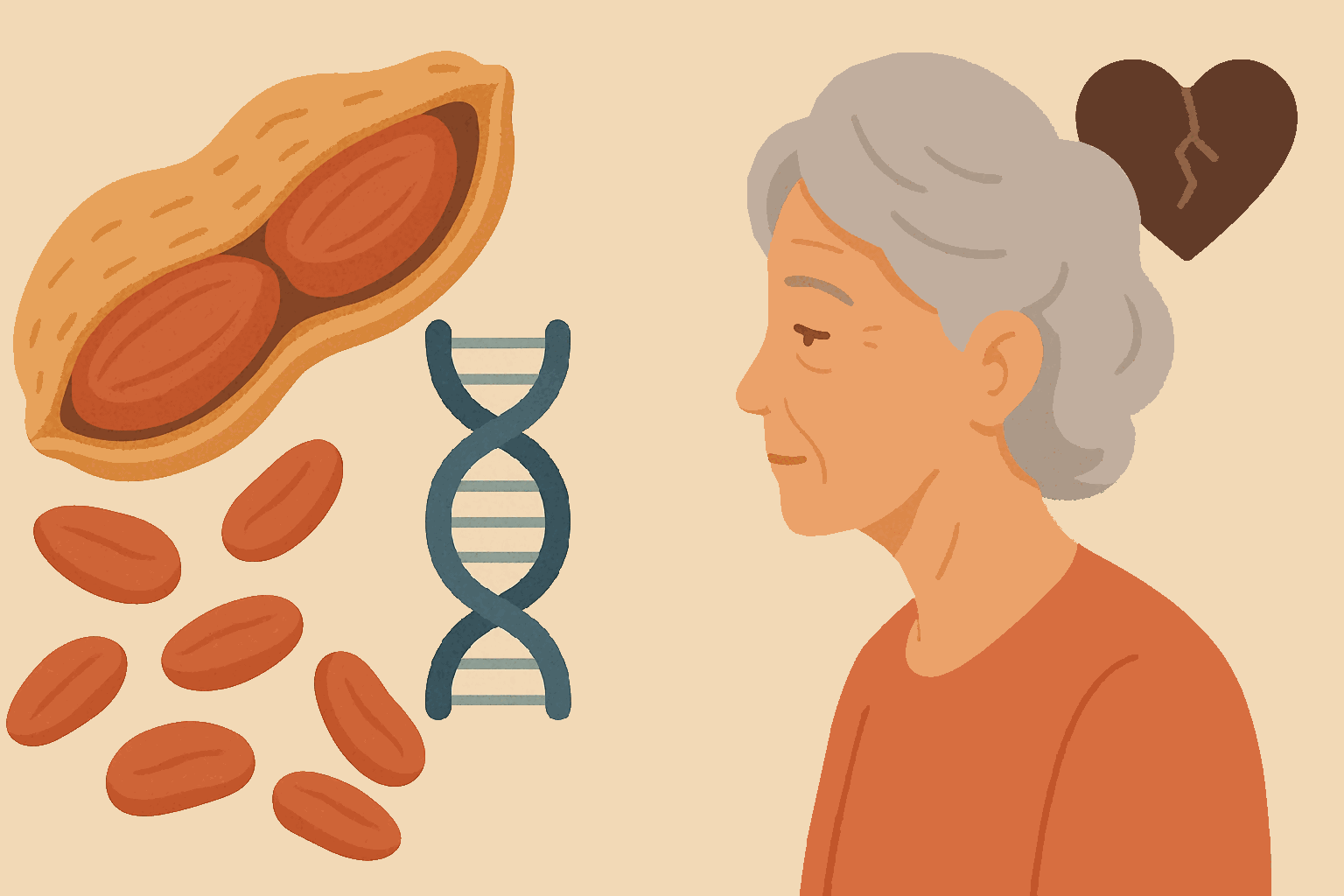
Taurine: Benefits, Uses, and Safety
- Olivia Hart
- Nutrition , Supplements , Health
- May 16, 2025
Table of Contents
Fast Facts: Understanding Taurine (TL;DR)
- What it is: Taurine is a naturally occurring, sulfur-containing amino sulfonic acid vital for various bodily functions.
- Conditionally Essential: Your body can produce taurine, but may need more from diet or supplements during illness, stress, or for specific health goals.
- Key Roles: Supports nerve function, heart health, muscle performance, eye health, and bile salt formation for digestion.
- Food Sources: Abundant in meat, seafood, and dairy. Limited in plant-based foods, but the body can synthesize it.
- Potential Benefits: May improve heart health markers, aid blood sugar control in diabetes, enhance exercise performance, and offer antioxidant effects.
- Supplementation: Generally safe up to 3,000 mg daily for most adults; higher doses under medical guidance. Consult a doctor before use, especially with medical conditions or medications.
- Energy Drinks: Contains taurine, but overall health impact of these drinks depends on other ingredients like sugar and caffeine.
You’ve likely encountered taurine on the ingredient list of energy drinks or pre-workout formulas, but this fascinating molecule is far more than just a supplement additive. Taurine is a naturally occurring, sulfur-containing amino sulfonic acid—often referred to as an amino acid—that plays a surprisingly diverse and vital role in your overall health and physiological function [1], [11]. While your body can produce taurine, certain circumstances can increase your requirements, making it a “conditionally essential” nutrient [14].
This article delves into the science behind taurine, exploring its functions, natural sources, evidence-based health benefits, and crucial safety information to help you understand if taurine supplementation might be a sensible choice for your health goals.
Understanding Taurine: What Is It and Why Is It Important?
Taurine is one of the most abundant amino sulfonic acids in various tissues, including the brain, retina, heart, and muscle cells [1]. Unlike true amino acids, it’s not incorporated into proteins, but it’s crucial for a wide array of physiological processes.
Your body primarily synthesizes taurine in the liver from the amino acids methionine and cysteine, requiring vitamin B6 as a cofactor. However, during periods of significant physiological stress, illness, rapid growth (like in infancy), or in individuals with certain metabolic conditions, the body’s production might not meet its needs [1], [14]. This is why taurine is classified as conditionally essential.
How Taurine Functions in Your Body
Taurine’s importance stems from its involvement in numerous fundamental cellular activities:
- Cellular Hydration and Electrolyte Balance: Taurine helps regulate fluid balance and electrolyte concentrations within cells, which is crucial for proper cell function, especially in electrically active tissues like the brain and heart [1].
- Bile Salt Formation: It combines with cholic acid to form bile salts, which are essential for the digestion and absorption of dietary fats and fat-soluble vitamins [1].
- Nervous System Regulation: Taurine acts as a neuromodulator in the central nervous system, contributing to nerve development, protection, and overall brain health. It also plays a role in vision, being highly concentrated in the retina [1].
- Calcium Signaling: It helps modulate intracellular calcium levels, which is critical for processes like muscle contraction, nerve impulse transmission, and hormone release [1].
- Antioxidant and Anti-inflammatory Properties: Taurine exhibits antioxidant activity, helping to neutralize harmful free radicals and reduce oxidative stress. It also has anti-inflammatory effects, protecting tissues from damage [2], [8].
- Muscle Function: Taurine is vital for muscle health, influencing muscle contraction, reducing exercise-induced oxidative stress, and potentially aiding in recovery [9].
- Immune System Support: It contributes to immune cell function and possesses cytoprotective properties [1].
Natural Food Sources of Taurine
 The primary dietary sources of taurine are animal-based proteins:
The primary dietary sources of taurine are animal-based proteins:
- Meat and Poultry: Particularly abundant in dark meat of chicken and turkey.
- Seafood: Shellfish (like scallops, mussels, and clams) and fish (such as tuna and cod) are excellent sources.
- Dairy Products: Milk, cheese, and yogurt contain smaller amounts.
Plant-based foods generally contain very little to no taurine [3]. Consequently, individuals following strict vegan or vegetarian diets typically have lower dietary taurine intake. However, healthy adults on these diets can usually synthesize sufficient taurine endogenously, making deficiency rare unless other health factors are at play [1], [14].
Taurine is also a common additive in energy drinks and various sports supplements. The taurine used in these products is typically synthetic and thus suitable for individuals on plant-based diets [3].
Evidence-Based Health Benefits of Taurine
A growing body of research suggests that taurine supplementation may offer several health advantages, particularly in specific populations or conditions.
1. Supporting Cardiovascular Health
Taurine appears to play a significant role in heart and blood vessel health. Studies indicate that it may:
- Improve Blood Pressure: Some research suggests taurine can help lower high blood pressure, a major risk factor for heart disease [13].
- Reduce Cholesterol and Triglycerides: Taurine supplementation has been linked to improvements in blood lipid profiles [6], [13].
- Enhance Heart Function: In individuals with heart failure, taurine has shown potential in improving cardiac function, reducing inflammation markers, and increasing exercise capacity [10], [13]. One systematic review and meta-analysis highlighted its benefits on hemodynamic parameters and cardiac function grading [13].
2. Aiding in Diabetes Management and Metabolic Health
Taurine levels are often lower in individuals with diabetes, and supplementation may offer benefits:
- Improved Insulin Sensitivity: Taurine may enhance the body’s response to insulin, helping to regulate blood sugar levels more effectively [7], [12].
- Reduced Blood Sugar Levels: Some studies have shown that taurine can help lower fasting blood sugar and HbA1c (a marker of long-term blood sugar control) in people with diabetes [12].
- Protection Against Diabetes Complications: Due to its antioxidant and anti-inflammatory properties, taurine might help mitigate some diabetes-related complications affecting nerves, kidneys, and blood vessels [7].
3. Enhancing Exercise Performance and Recovery
 Athletes and active individuals may find taurine beneficial:
Athletes and active individuals may find taurine beneficial:
- Increased Endurance: A meta-analysis found that oral taurine ingestion (1-6 grams) improved overall endurance performance [9].
- Reduced Muscle Damage: Taurine may help protect muscles from exercise-induced damage and oxidative stress [9].
- Improved Recovery: It might speed up recovery post-exercise by reducing markers of muscle soreness and inflammation [2].
- Fatigue Delay: By improving muscle function and oxygen uptake, taurine could help delay the onset of fatigue during physical activity.
4. Other Potential Benefits Under Investigation
Preliminary research indicates taurine might also contribute to:
- Eye Health: High concentrations in the retina suggest a protective role against retinal degeneration [1].
- Hearing Function: Taurine may play a part in auditory system health.
- Neuroprotection: Its roles in the brain suggest potential benefits for neurological disorders, though more human research is needed [1].
- Liver Function: Taurine may support liver health by aiding in detoxification processes and protecting against oxidative stress [2].
- Healthy Aging: Some researchers propose taurine as a “longevity nutrient” due to its widespread protective effects, although this is an emerging area of study [4].
It’s important to note that while promising, many of these “other potential benefits” require more robust human clinical trials for confirmation.
Taurine Supplementation: Dosage, Safety, and Potential Side Effects
Taurine is generally considered safe when consumed in amounts typically found in food and when supplemented appropriately by healthy adults.
- Dosage: Common supplemental doses range from 500 mg to 3,000 mg (3 grams) per day, often divided into smaller doses [1], [9]. The European Food Safety Authority (EFSA) has indicated that supplemental taurine intake up to 6,000 mg (6 grams) per day is unlikely to pose safety concerns for adults [5]. However, it’s always best to start with a lower dose to assess tolerance.
- Forms: Taurine supplements are available in powder or capsule form. Powder can be mixed with water or other beverages.
- Timing: For exercise performance, taurine is often taken 60-120 minutes before activity [9]. For general health, it can be taken with or without food.
Potential Side Effects and Precautions: Taurine is well-tolerated by most individuals. Reported side effects are rare and generally mild, sometimes including nausea, headache, or stomach discomfort, though it’s often unclear if these are directly due to taurine or other ingredients in combined supplements [8].
Important Considerations:
- Medication Interactions: Taurine may inhibit cytochrome P450 enzymes, which are involved in the metabolism of many drugs. If you are taking medications, particularly antidepressants, antiepileptics, blood thinners (like warfarin), or statins, it is crucial to consult your healthcare provider before taking taurine supplements to avoid potential interactions [3].
- Kidney Disease: Individuals with pre-existing kidney conditions should use taurine with caution and under medical supervision, as impaired kidney function can affect its clearance from the body.
- Pregnancy and Breastfeeding: There is insufficient research on the safety of taurine supplements during pregnancy and breastfeeding. It’s best to avoid supplementation unless advised by a healthcare professional.
- Energy Drinks: While energy drinks contain taurine, their overall health impact is often questioned due to high levels of caffeine, sugar, and other stimulants. The benefits of taurine in these beverages may be overshadowed by the negative effects of these other ingredients [15]. Relying on energy drinks as a source of taurine is not recommended.
Who Might Benefit from Taurine Supplementation?
While most healthy individuals produce and consume enough taurine, supplementation could be considered by:
- Athletes and highly active individuals: Seeking to enhance performance, reduce muscle damage, and improve recovery [9].
- Individuals with type 2 diabetes: As an adjunct therapy to help manage blood sugar and potentially reduce complications, under medical guidance [12].
- People with certain cardiovascular conditions: Such as heart failure or high blood pressure, again, always in consultation with a cardiologist [13].
- Vegans and strict vegetarians: While deficiency is rare, some may consider supplementation if concerned about lower intake and suboptimal synthesis, especially if also experiencing high physiological demands.
- Individuals with conditions leading to increased taurine depletion or impaired synthesis: This should be determined and monitored by a healthcare professional.
The Bottom Line on Taurine
Taurine is a vital, conditionally essential amino sulfonic acid with a remarkable array of functions crucial for human health. It’s abundant in animal-based foods and can also be synthesized by the body.
Scientific evidence increasingly supports the benefits of taurine supplementation for specific health outcomes, particularly in improving cardiovascular markers, aiding diabetes management, and enhancing exercise performance. It is generally safe for most healthy adults within recommended dosages.
However, as with any supplement, it’s not a magic bullet. A balanced diet, regular exercise, and a healthy lifestyle remain the cornerstones of well-being. If you are considering taurine supplementation, especially if you have any underlying health conditions or are taking medications, always consult with your healthcare provider to ensure it’s appropriate and safe for your individual needs. They can help you weigh the potential benefits against any risks and determine the right approach for you.
Frequently Asked Questions (Q&A)
Q1: What is taurine and what does it do in the body?
Q2: What are the main health benefits of taking taurine supplements?
Q3: Are there natural food sources of taurine?
Q4: Is taurine safe to take daily, and what are the side effects?
Q5: How much taurine should I take for exercise performance?
Disclaimer
The information provided on BioBrain is intended for educational purposes only and is grounded in science, common sense, and evidence-based medicine. It is not a substitute for professional medical advice, diagnosis, or treatment. Always consult a qualified healthcare provider before making significant changes to your diet, exercise routine, or overall health plan.
References
- Schaffer, S., & Kim, H. W. (2018) "Effects and Mechanisms of Taurine as a Therapeutic Agent"
- Wen, C., Li, F., Zhang, L., et al. (2019) "Taurine is Involved in Energy Metabolism in Muscles, Adipose Tissue, and the Liver"
- Stapleton, P. P., Charles, R. P., Redmond, H. P., & Bouchier-Hayes, D. J. (1997) "Taurine and human nutrition"
- Ames, B. N. (2021) "Prolonging healthy aging: Longevity vitamins and proteins"
- European Food Safety Authority (EFSA) (2012) "Scientific Opinion on the safety of caffeine"
- Sarkar, P., Basak, P., Ghosh, S., et al. (2017) "Taurine ameliorates arsenic-induced oxidative stress and alleviates cardiotoxicity in rats"
- Chen, W., Guo, J., Zhang, Y., & Zhang, J. (2016) "The beneficial effects of taurine in preventing diabetes mellitus and diabetic complications"
- Wu, G. (2020) "Important roles of dietary taurine, creatine, carnosine, anserine and 4-hydroxyproline in human nutrition and health"
- Waldron, M., Patterson, S. D., Tallent, J., & Jeffries, O. (2018) "The Effects of an Oral Taurine Dose and Supplementation Period on Endurance Exercise Performance in Humans: A Meta-Analysis"
- Ahmadian, M., Dabidi Roshan, V., & Ashourpour, M. (2017) "Taurine supplementation improves functional capacity, myocardial oxygen consumption, and electrical activity in heart failure"
- National Center for Biotechnology Information (NCBI) (2023) "PubChem Compound Summary for CID 1123, Taurine"
- Ito, T., Schaffer, S. W., & Azuma, J. (2012) "The potential usefulness of taurine on diabetes mellitus and its complications"
- Bali, T., & Singh, M. (2024) "Insights into the cardiovascular benefits of taurine: a systematic review and meta-analysis"
- Lourenco, R., & Camilo, M. E. (2002) "Taurine: a conditionally essential amino acid in humans? An overview in health and disease"
- Mayo Clinic Staff (2023) "Taurine in energy drinks: What is it?"
Tags :
- Taurine
- Amino acids
- Nutritional supplements
- Heart health
- Exercise performance
- Diabetes
- Food


